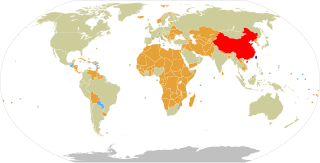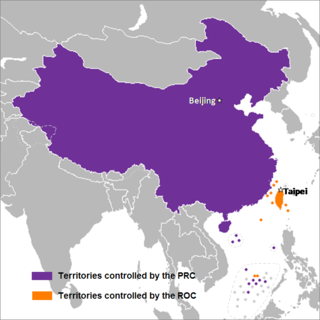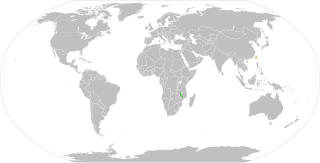
Kiribati is a full member of the Commonwealth, the IMF and the World Bank, and became a full member of the United Nations in 1999. Kiribati hosted the Thirty-First Pacific Islands Forum in October 2000. Kiribati has Least Developed Country Status and its interests rarely extend beyond the region. Through accession to the Lomé Convention, then Cotonou Agreement, Kiribati is also a member of the African Caribbean and Pacific Group. Kiribati maintains good relations with most countries and has particularly close ties to Pacific neighbours Japan, Australia, South Korea and New Zealand. Kiribati briefly suspended its relations with France in 1995 over that country's decision to renew nuclear testing in the South Pacific.

Taiwan, formally known as the Republic of China (ROC), currently has formal diplomatic relations with 11 of the 193 United Nations member states and with the Holy See, which governs the Vatican City State, as of 22 January 2024. In addition to these relations, the ROC also maintains unofficial relations with 59 UN member states, one self-declared state (Somaliland), three territories, and the European Union via its representative offices and consulates under the One-China Principle. In 2021, the Government of the Republic of China had the 33rd largest diplomatic network in the world with 110 offices.
The political status of Taiwan or the Taiwan issue is a long-running dispute on the political status of Taiwan, currently controlled by the Republic of China (ROC). This dispute arose in the mid-twentieth century, and is ongoing.

Nauru, following independence from the United Kingdom, became a sovereign, independent republic on 31 January 1968. Nauru has established diplomatic relations with a number of nations, including most of its Pacific neighbors with which it maintains economic, cultural and administrative ties.

Since its founding in 1949, the People's Republic of China (PRC) has had a diplomatic tug-of-war with its rival in Taiwan, the Republic of China (ROC). Throughout the Cold War, both governments claimed to be the sole legitimate government of all China and allowed countries to recognize either one or the other. Until the 1970s, most Western countries in the Western Bloc recognized the ROC while the Eastern Bloc and Third World countries generally recognized the PRC. This gradually shifted and today only 11 UN member states recognize the ROC while the PRC is recognized by the United Nations, as well as 181 UN member states. Both the ROC and the PRC maintain the requirement of recognizing its view of the One China policy to establish or maintain diplomatic relations. The United Kingdom did recognize the PRC in 1950 but an exchange of Ambassadors was refused by the PRC until 1972.
Checkbook diplomacy or chequebook diplomacy, is used to describe a foreign policy which openly uses economic aid and investment between countries to achieve diplomatic favor.

The term "Two Chinas" refers to the geopolitical situation where two political entities exist under the name "China".

Oceania is, to the People's Republic of China and the Republic of China, a stage for continuous diplomatic competition. The PRC dictates that no state can have diplomatic relations with both the PRC and the ROC. As of 2024, eleven states in Oceania have diplomatic relations with the PRC, and three have diplomatic relations with the ROC. These numbers fluctuate as Pacific Island nations re-evaluate their foreign policies, and occasionally shift diplomatic recognition between Beijing and Taipei. The issue of which "Chinese" government to recognize has become a central theme in the elections of numerous Pacific island nations, and has led to several votes of no-confidence.

The Embassy of the United States, Taipei is a former United States diplomatic mission in Zhongshan District, Taipei, Taiwan. The building currently houses the Taipei Film House as a movie theater.

Malawi–Taiwan relations refer to foreign relations between Malawi and Taiwan. Diplomatic relations existed from 1966 to 2008. There are no current official diplomatic relations between the two countries.

Burkina Faso–China relations refer to the diplomatic interactions between Burkina Faso and the People's Republic of China (PRC). Both nations maintain embassies in each other's capitals, Beijing and Ouagadougou, respectively.

Nauru–Taiwan relations are relations between the Republic of Nauru and Taiwan, officially the Republic of China (ROC). Official diplomatic relations were first established in 1980. Relations were first severed in 2003, when Nauru opted to recognize the People's Republic of China. Formal bilateral relations with Nauru were reestablished in 2005, and maintained until 2024.

Palau–Taiwan relations are the bilateral relations between Palau and Taiwan. Palau maintains an embassy in Taipei and the ROC maintains an embassy in Koror City. Exchanges between the two nations range from agriculture, culture, education, fishery, medical services, tourism and water supply infrastructure. As of 8 January 2024, Palau is one of only 12 United Nations member states to have formal diplomatic relations with Taiwan.













